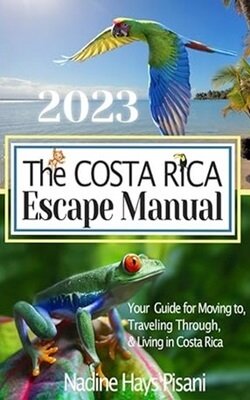- Home
- Crime
Search this site
Crime in Costa Rica
Costa Rica, a tropical paradise with attractions like Arenal Volcano, Monteverde Cloud Forest, and Manuel Antonio National Park, continues to be a premier choice for vacationers and expatriates from around the world. As with all countries, however, understanding the crime dynamics is important for those considering a visit or a move.
One of the first things that people ask me about living in Costa Rica is whether it is safe and how much crime there is.
Comparing the crime data in Costa Rica to that
of countries such as the United States, Canada, and England uncovers
some interesting insights. While the phrase "crime in Costa Rica" and being located in Central America, might
paint an unfavorable image, the situation is, in fact, slightly
different from what it appears on the surface.
Comparing Costa Rica Crime Levels to other Countries
According to the Global Peace Index in 2023, where 1 is the safest
country and 163 is the least safe, Costa Rica ranked 39 while Canada
ranked 11, England 37 and the United States 131.
Costa Rica's
overall crime rate is lower than that of the United States but there are some categories with exceptions. Petty thefts and non-violent crimes such as pickpocketing and
bag-snatching are much more common in Costa Rica.
Many petty crimes occur
primarily in major tourist areas where foreigners might be perceived as
an easy target.
Homicides appear to be lower at first glance but you need to dig into the numbers to see the real story.
Is Costa Rica Safe ?
Now,
the question "Is Costa Rica safe?" is something that potential visitors
or settlers are bound to ask. According to expatriate communities and
frequent travelers, the answer is generally "yes" However, as with
any destination, exercising caution and staying smart about personal
safety go a long way.
In terms of violent crime, Costa Rica's
overall crime rates appears to be lower when compared to the United States. However one must examine the numbers more closely to get the real answer. IMPORTANT! There is an aspect of living here that no real estate company, travel agency, Airbnb/VRBO host, relocation service or tourist related business will tell you. Even homeowners who moved here usually keep quiet because they worry that negative publicity will impact the value of their home should they decide to sell and leave (which about 50% of Expats do). The number of murders per capita have recently increased in 2023 and are about twice that of the United States. Home invasions have also seen a dramatic increase, especially in the higher end tourist locations such as the communities in and around Playa Flamingo, Playas del Coco, Potrero/Surfside and Tamarindo. In addition, many crimes go unreported resulting in skewed statistics.
Some people will challenge this and compare the United State's annual homicide rate of 25,000 per year to Costa Rica's 800 and claim that Costa Rica does not have a problem. But remember, the US has a population of 350 million as compare to Costa Rica's 5 million. If you extrapolate Costa Rica's numbers based on the US population, Costa Rica would have 56,000 homicides compared to the United State's 25,000, or a ratio of about 2.25:1. However, It must be noted than many of these homicides involve people in gangs or the drug trade. As with many parts of the world, If you are not involved in the drug trade, the risks go down significantly.
Tourist
destinations in Costa Rica are generally safe to
explore, even at night, but
like any city in the world,
there are areas that are very dangerous and should be avoided. It is still advised to keep a close eye on personal belongings and avoid
isolated routes or places with limited visibility and a scarce police
presence.
While exploring Costa Rica, tourists are also advised
to avoid displaying wealth openly. Carrying large amounts of money,
expensive jewelry, and electronic devices can attract unwanted attention
and make tourists an easy target. Never leave anything visible in your car or leave things unattended at the beach.
Costa Rica can lull you into a false sense of security due to the tranquility and beauty of the country. It amazes me how many people come to Costa Rica and feel like they can leave their windows and doors open/unlocked at night, something that they would never do in their home country. Often this results in crimes of opportunities where passerbys see this and quietly come inside and steal things while you are sleeping.
We have known people that left their wallet, purse and even car keys inside their unlocked vehicle and then wonder why they were robbed. Again, something they probably wouldn't do at home. Others rented a house on the beach, had a big party with lots of drinking, fell asleep with everything open and unlocked and were robbed.
Personally, we have traveled all over Costa Rica since 2017 and have never experienced or witnessed any type of crime nor did we ever feel threatened. We feel safer in Costa Rica than in the United States. But we also realize that if we ever do need help from police, it probably isn't go to be there when we need it.
The one thing I learned while living here, and it can be summarized in one phrase, "Some Costa Ricans want your stuff, not you".
Police Corruption
Regarding the question, "Are the police in Costa Rica corrupt?" While no country can wholly escape instances of police corruption, Costa Rica has been noted for having a reliable and professional police force. The vast majority of interactions between law enforcement and civilians are honorable and above board.
I have experienced numerous interactions with police during routine roadblocks and checkpoints. All but one have been a good experience. The one bad one just felt different when we pulled up. As soon as he motioned me to roll my window down and saw that I was a "gringo", he directed me to pull over. He proceeded to show me his phone where he had already translated a paragraph from Spanish to English asking for a cash donation to help fix the Tamarindo's police station's septic tank system . I politely told him in Spanish, "no thank you, not today" and I was on my way. This interaction can be very intimidating for the first time visitor that just got off the plane and is headed to their hotel.
The Costa Rican police, known as the "Fuerza
Pública," are generally quick in responding to major emergencies and slow to respond, if at all, to everything else. While they take crime seriously and show appreciation for reports from the
public, you probably are not going to get any resolution or justice to most crimes unless someone catches them in the process and has ample proof such as a video. People that do get caught are often released quickly only to repeat additional crimes.
Nevertheless, it's
important to remember the police force in Costa Rica is not as extensive
or resourced as those in more developed countries like the U.S.,
Canada, and England and are therefore often overwhelmed with the various tasks of their jobs. Consequently, visitors and residents are encouraged to take additional precautions and make their safety a
personal responsibility - much as they would anywhere else in the world.
If you dial 911, most likely you are going to have a long wait for someone to show up. Sparsely populated and isolated areas combined with lack of exact addresses will usually result in long delays for the police to respond. We were behind an accident one evening, in a well populated but touristy area, and it took almost an hour for the police to arrive and even longer for the ambulance.
Crime Areas
The
coastal areas of Costa Rica, loved for their pristine beaches and
splendid biodiversity, are generally safe if one uses basic precautions. The
same applies to the central regions where larger cities like Alajuela, Atenas and Heredia are located. However, caution is still
necessary, especially when visiting crowded tourist locations. The capital of Costa Rica, San Jose, is generally safe but there are some bad neighborhoods that you should avoid.
Areas
like Limón and Puntarenas witness higher crime rates due to economic
disparities and drug trafficking issues. However, these regions are not
typically on the itinerary of most tourists, making their safety
concerns less relevant to the average visitor.
Master planned residential communities focusing on the expat can draw attention to criminal behavior. Costa Rica boasts a variety of gated
communities, providing an additional layer of security for those
looking for it. However, the term "gated" may not be as secure as a gated community in the United States. Some communities give the appearance of being secure with large, controlled entrances and security personnel, but in reality, people can just walk around the perimeter and easily enter and leave the community without anybody noticing.
Costa Rica has recently seen a steady growth of U.S., Canadian, European and
British retirees and families in recent years due many people realizing that, at after COVID, one can work remotely from anywhere in the world that has good fast and reliable internet such as Costa Rica. This influx of foreigners seems to be resulting in an increase in crime that is not yet reflected in the overall statistics.
Safety in Costa
Rica varies—as it does in every country—according to the region,
sociopolitical climate, and economic inequalities. Though crime exists,
it's certainly not rampant, and the possibility of being affected by
crime should not deter anyone from considering Costa Rica as a travel or
relocation destination.
Friendly People in a Relatively Safe and Beautiful Country
The Costa Rican people themselves are
noted for their hospitable and friendly nature towards outsiders. Ticos,
as Costa Ricans are known, are proud of their country and
willing to help foreigners navigate their homeland.
When it comes to security, Costa Rica has made great
strides to secure its place as a safe country to move to. Numerous expat
communities have flourished across the country, providing testament to
this. Reportedly, the majority of expats feel safer living in Costa Rica
than in their home countries.
Taking all things into
consideration, the risk of major crime in Costa Rica is relatively low.
However, as is common in most countries with a high influx of tourists,
petty crimes like pickpocket and scams are something to be cautious
about.
While traveling around Costa Rica, personal vigilance,
rather than fear of crime, should be the guiding principle. A sense of
adventure combined with common sense will undoubtedly lead to
unforgettable experiences in this tropical paradise.
As in any
country worldwide, the very nature of crime in Costa Rica is dynamic.
It's essential to remain updated with the latest travel advisories and
establish connections with local communities to have an accurate measure
of the current situation.
Whether
you’re looking for daring adventures or relaxing vacations, Costa Rica
offers both. Remember, crime is everywhere in the world, what differs is
the pattern and frequency. Being aware and responsible for your own
safety will ensure that your Costa Rica experience remains a joyful
memory.
In conclusion, Costa Rica, with its
vibrant culture, stunning biodiversity, and welcoming people, is indeed a
country where one can enjoy thrilling adventures and create memorable
experiences. Costa
Rica is predominantly safe, provided we remember that despite its
inviting landscapes and friendly people, we still must be cautious and
austere in our understanding of safety. With the right mindset and
precautions, Costa Rica can certainly be a safe and rewarding journey,
whether you're there for a vacation or considering a move.

